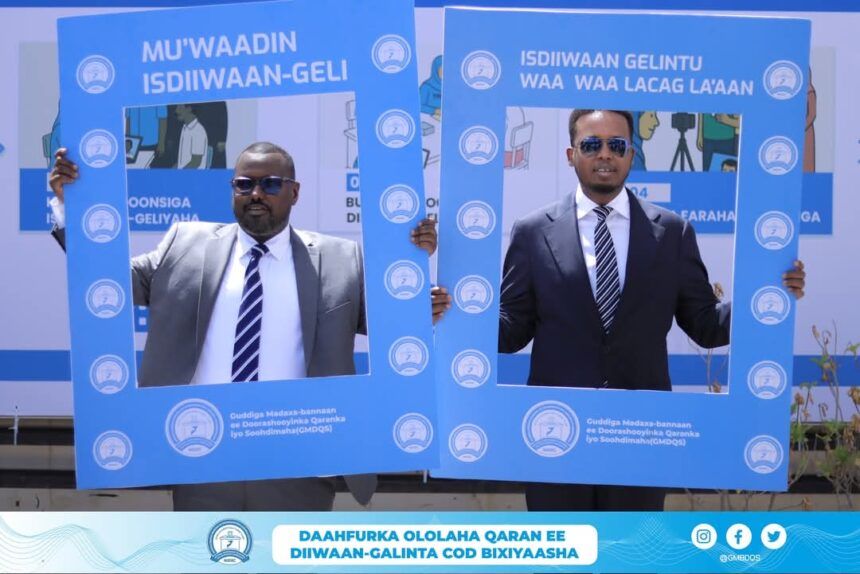By Nuri Aden
The moon was a new frontier, Internet was still a fledgling concept, the United Nations had only 126 members, and Africa was in the throes of decolonisation when Somalis last prepared to vote in a direct election in 1969.
That was two years after the East African nation’s first President Aden Abdulle Osman Da’ar, conceded electoral defeat, setting the stage for what he and everyone else had hoped would be a smooth and swift transition to an enduring democracy.
It’s been a long wait spanning more than five decades for the promise of a fully democratic system to take shape.
As Somalia prepares for a direct election based on the principle of "one person, one vote" – the country’s landmark voter registration process started recently – there is widespread enthusiasm about the prognosis of deepening democracy in a country emerging from conflict.

The fact that voter registration commenced in Mogadishu’s Banadir region, notably in Shangaani district, despite prevailing security concerns has led analysts to believe the exercise will remain on track.
Prime Minister Hamza Abdi Barre visited the registration site, queuing alongside citizens and other Somali leaders to encourage voters to get their names included in the rolls.
“Those who claimed this country could not hold credible elections have been proven wrong by the overwhelming turnout. Politicians and aspiring leaders must now appeal to the public with their manifestos and track records,” Barre said.
Minister of family affairs and human rights, Khadija Mohamed Al-Makhzoumi, became the first member of the government to register officially.
“The public turnout was truly inspiring. Citizens showed up in large numbers to claim their constitutional right to vote — one of the pillars of human rights. Somalia is making history. This is democracy in action. Insha Allah, Somalia will succeed,” he said.
According to ports and marine transport minister Abdulkadir Mohamed Nur, a one-person-one-vote electoral system “eliminates lack of accountability” and lays the foundation for a free and fair election.
Amid rising expectations, challenges persist. Two central federal member states, Puntland and Jubaland, have suspended cooperation with the central government.
Gedo’s regional governor, Mohamed Hussein Al-Qaadi, highlighted tensions and the hurdles along the path to the hustings. “They cannot bring elections to this region since no unified electoral body exists. We don’t see polls being held in the Gedo region.”
Former President Mohamed Abdullahi Farmaajo warned against divisive electoral actions, emphasising the importance of unity to ensure that democracy thrives.
“Elections and constitutional changes that exclude Puntland, Jubaland and a section of the political leadership are tantamount to disregarding the nation’s unity and solidarity,” he said.
But President Hassan Sheikh Mohamud is confident that democracy will triumph in Somalia at the end of the day.
“Somalia has turned the corner, established institutions, has its own Constitution, and is preparing right now to go into a one-person, one-vote election. It’s been 56 years since we last had universal suffrage,” he said.
Massive outreach
The National Independent Electoral and Boundaries Commission (NIEBC), led by chairperson Abdikarim Ahmed Hassan, fixed January 20 to April 21 as the window for registration of political parties ahead of the landmark vote.
To qualify, parties are required to have at least 10,000 members.
Around 800 centres nationwide have been identified for the elections in Mogadishu (Banadir region), Hirshabelle, Galmudug, Jubaland, South West State and SSC-Khaatumo.
The NIEBC streamlined the electoral districts from the pre-1991 total of 95 to 65 districts, making election management more feasible.
The commission has deployed advanced digital registration technology to facilitate ease of voting and provided extensive training to electoral staff.
With only a year remaining in President Mohamud’s term, influential Somali politicians – including former Prime Ministers Omar Abdirashid Ali Sharmarke and Abdiweli Mohamed Ali Gaas, and former Southwest President Sharif Hassan Sheikh Aden – have endorsed government-led national dialogues to bridge the political divisions.
In August 2024, the federal cabinet unanimously passed the Political Associations and Parties Bill and the National Electoral Bill, marking significant legislative progress towards the elections scheduled for June.
Chequered history
Since gaining independence, Somalia has had nine Presidents and ten presidential elections. Only two —Aden Abdulle Osman and Abdirashid Ali Sharmarke — were elected directly by popular vote.
Osman's seamless transfer of power to Sharmarke after losing the 1967 election marked a first.
However, Somalia's promising democratic progress was abruptly halted in 1969 when Sharmarke was assassinated, followed immediately by a military coup.
The parliamentary elections held earlier that year, contested by about 64 political parties, were overshadowed by accusations of widespread electoral fraud and political fragmentation, and ultimately became the last multi-party elections for decades.
Following the collapse of Somalia’s central government in 1991 amid civil war, indirect elections became the standard practice.
In 2012, Somalia resumed parliamentary elections, selecting MPs through 135 traditional elders from major clans.
This delegate-based indirect election expanded to 14,025 representatives in 2016, further increasing during the 2022 elections, with the 275 elected members of the People's Assembly and 54 senators jointly picking the President.
As Somalia seeks to re-establish direct democracy through universal suffrage despite political complexities and regional tensions, observers hope the outcome will be worth the wait.
If Somalia's renewed democratic aspirations pay off, it will pave the way for a stable Horn of Africa.



















